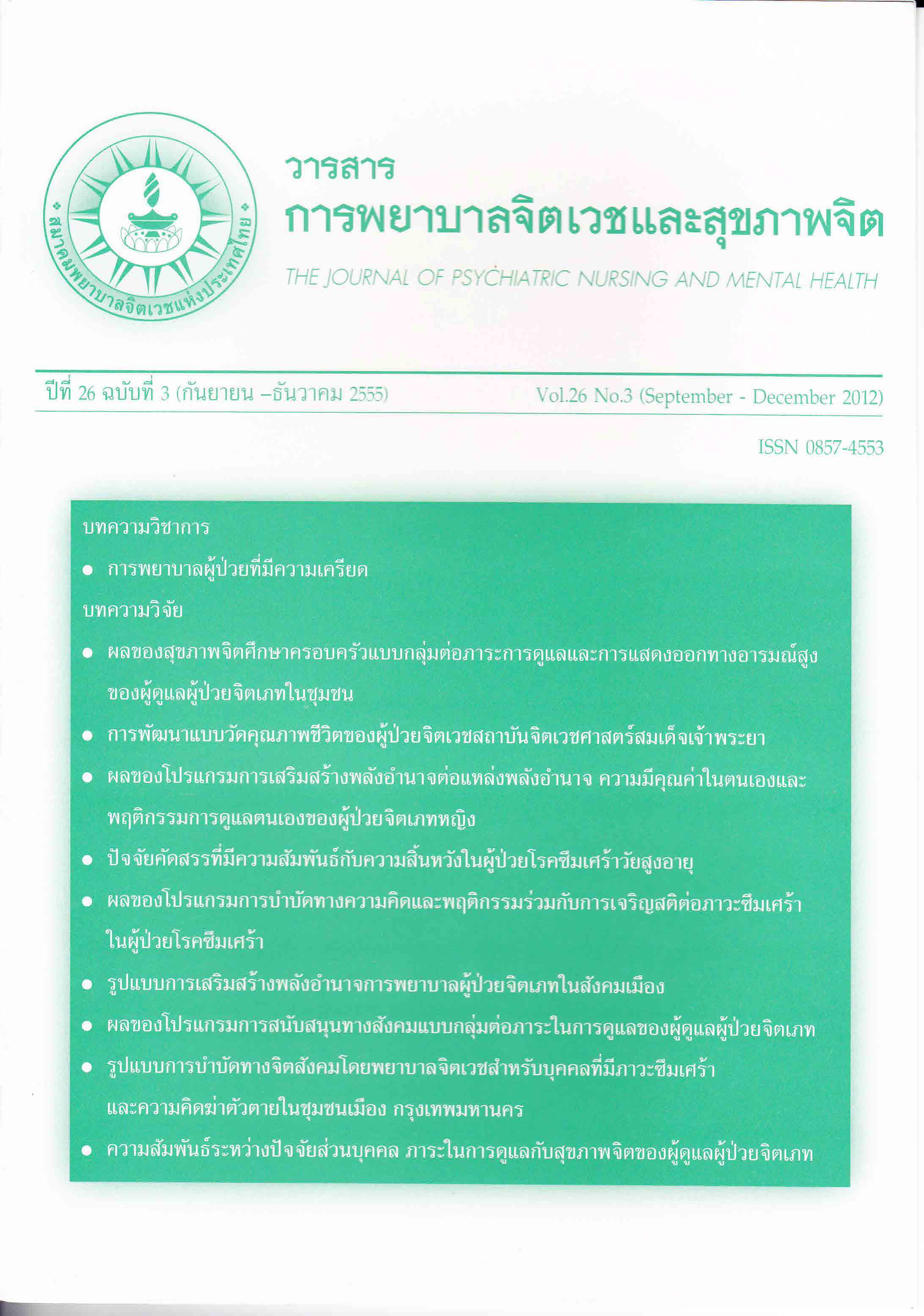ผลของโปรแกรมการบำบัดทางความคิดและพฤติกรรมร่วมกับการเจริญสติต่อภาวะซึม เศร้าในผู้ป่วยโรคซึมเศร้า
Main Article Content
บทคัดย่อ
บทคัดย่อ
การวิจัยกึ่งทดลองครั้งนี้มีวัตถุประสงค์เพื่อศึกษาผลของโปรแกรมการบำบัดทางความคิดและพฤติกรรมร่วมกับการเจริญสติต่อภาวะซึมเศร้าในผู้ป่วยโรคซึมเศร้า กลุ่มตัวอย่างมีจำนวน 40 ราย คือ ผู้ป่วยโรคซึมเศร้าที่คลินิกจิตเวชโรงพยาบาลมะการักษ์ โดยจับคู่กลุ่มทดลองและกลุ่มควบคุมกลุ่มละ 20 ราย พิจารณาจากเพศ อายุ และระดับภาวะซึมเศร้า กลุ่มทดลองได้รับโปรแกรมการบำบัดทางความคิดและพฤติกรรมร่วมกับการเจริญสติ ส่วนกลุ่มควบคุมได้รับการพยาบาลตามปกติ โดยโปรแกรมการบำบัดทางความคิดและพฤติกรรมร่วมกับการเจริญสติพัฒนามาจาก CBT ของ Beck (1979)และ MBCT ของ Segal, Williams & Teasdale (2002) เก็บรวบรวมข้อมูลโดยใช้แบบบันทึกข้อมูลส่วนบุคคล และแบบประเมินภาวะซึมเศร้าของ Beck (BDI) ทุกเครื่องมือผ่านการทดสอบความตรงตามเนื้อหาจากผู้ทรงคุณวุฒิจำนวน 5 ท่านและตรวจสอบความเที่ยงของแบบประเมินภาวะซึมเศร้า มีค่าความเที่ยงเท่ากับ .86 วิเคราะห์ข้อมูลโดยใช้ค่าเฉลี่ย ส่วนเบี่ยงเบนมาตรฐาน และสถิติทดสอบค่าที
ผลการวิจัยพบว่า : 1) เมื่อสิ้นสุดการทดลองภาวะซึมเศร้าของกลุ่มทดลองภายหลังได้รับโปรแกรมการบำบัดทางความคิดและพฤติกรรมร่วมกับการเจริญสติน้อยกว่าก่อนได้รับโปรแกรมอย่างมีนัยสำคัญทางสถิติที่ระดับ .05 2) เมื่อสิ้นสุดการทดลองภาวะซึมเศร้าของกลุ่มทดลองที่ได้รับโปรแกรมการบำบัดทางความคิดและพฤติกรรมร่วมกับการเจริญสติน้อยกว่ากลุ่มที่ไม่ได้รับการฝึกโปรแกรมอย่างมีนัยสำคัญทางสถิติที่ระดับ .05
คำสำคัญ : ภาวะซึมเศร้า, โรคซึมเศร้า, การบำบัดทางความคิดและพฤติกรรมร่วมกับการเจริญสติ
Abstract
The purposes of this quasi-experimental research were to study the effect of cognitive behavioral therapy and mindfulness on depression in patients with depressive disorder. Samples were 40 depressive disorder patients from psychiatric clinic of Makarak hospital. They were divided into the experimental group and the control group with 20 in each group by matching gender, age and level of depression. The experimental group received cognitive behavioral therapy and mindfulness-based program while the control group received routine nursing care. Experimental instruments were cognitive behavioral therapy and mindfulness-based program developed from CBT of Beck (1979) and MBCT of Segal, Williams & Teasdale (2002). Data were collected by demographic data form and Beck Depression Inventory Scale (BDI). The instruments were tested for content validity by 5 experts. The reliability of BDI were .86. Means, standard deviation, and t-test were employed for data analyses statistic.
Major findings were as follows : 1) The depression score after receiving the cognitive behavioral therapy and mindfulness-based program was significantly less than before receiving program, at the .05 level. 2) The depression score after receiving the cognitive behavioral therapy and mindfulness-based program was significantly less than those who did not receive the program who could not receive the program, at the .05 level implication for nursing.
Keywords : Depression, Depressive disorder, Cognitive Behavioral Therapy and Mindfulness-Based Program
Article Details
บทความที่ได้รับการตีพิมพ์แล้ว เป็นลิขสิทธิ์ของสมาคมพยาบาลจิตเวชแห่งประเทศไทย


